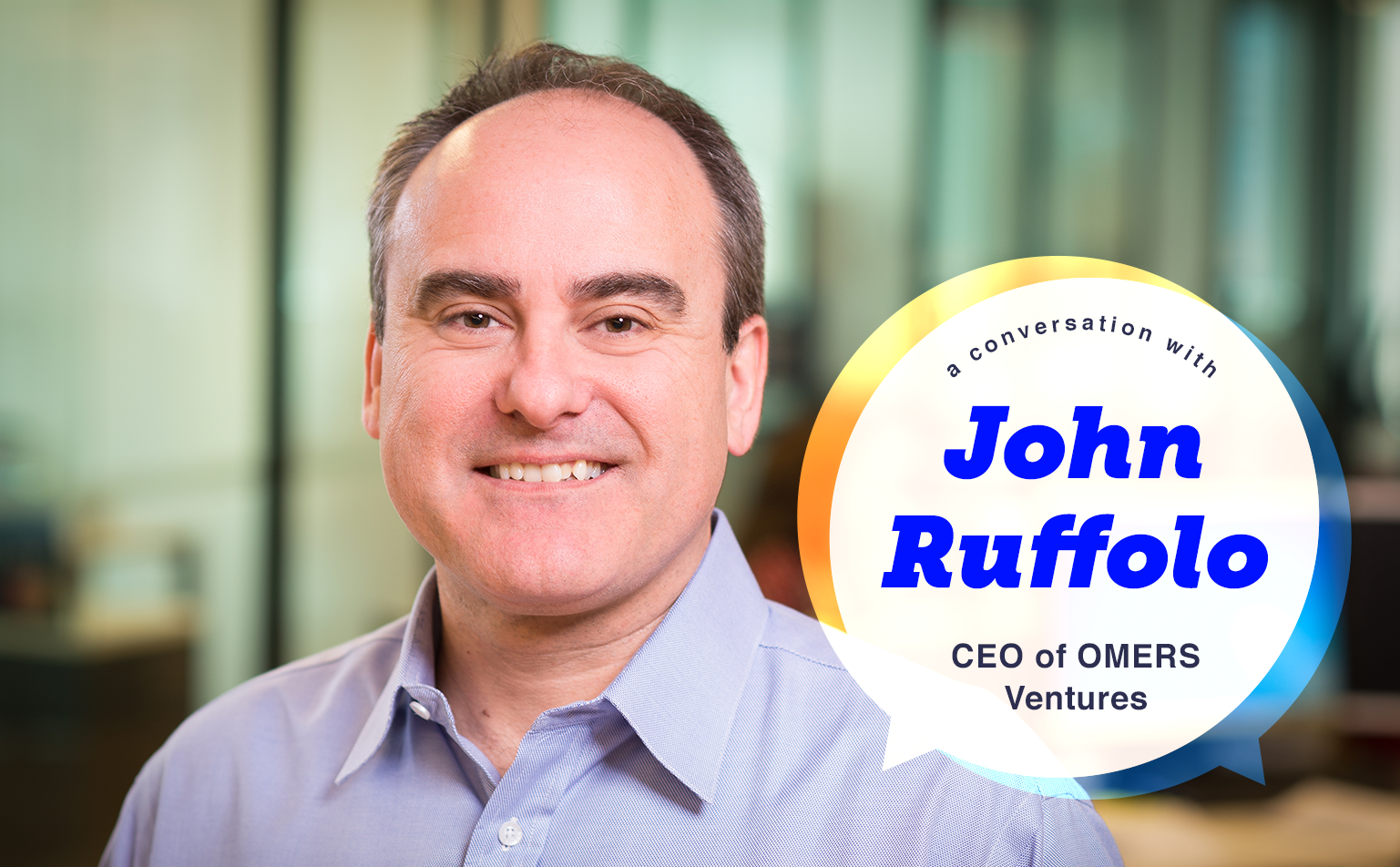When it comes to startups, timing is everything. It’s a lot like surfing—you’ve got to know when to pop up. You’ve got to know when to go from the paddling position, lying on top of your board, to a standing, upright position. Too early or too late, you’ll miss the wave altogether. John Ruffolo, CEO of OMERS Ventures, isn’t a surfer in the literal sense. He doesn’t ride the proverbial wave—he provides the water. He is the wave. Since launching in 2011, his company has invested over $350 million in 30 Canadian companies. His work has created more than 5,000 jobs and attracted $1.4 billion in capital. With eyes firmly fixed upon the horizon, John is preoccupied with the future of retail, the fintech revolution, the future of work, the future of transportation, and synthetic biology. But how did John, somewhat of a slacker in high school, become one of Canada’s technology, media, and telecommunications oracles? Two words: adaptability and optionality. Very much like water.
Part 1: High School

John, let’s take it back. Before OMERS, before Deloitte, before Schulich—all the way back to when you were in high school. Who were you back then?
I was an academic who probably didn’t work as hard as he probably should have, haha! However, academics came relatively easy for me.
So as you got closer to the end of your high school career, how did you feel about the future?
Very optimistic. My career aspirations already more-or-less formed. When I was in elementary school, I always wanted to be a lawyer. When I was 16, I started working at a bank. By the time I was 17, the one subject that I had loved (and was very strong at) was accounting. However, if you noticed, the pattern there was—and I think this is the most significant change from today, versus when I was going to school—the pre-eminent aspiration was to be in a profession (and not in entrepreneurship). I stayed within the classic lawyer/accountant/banker archetype.
Your choice of university was the Schulich School of Business, where you completed a BBA. Why that school, over others?
Two reasons. One, I gave up the lawyer path. And I was still deciding between becoming a banker or an accountant. Schulich was one of the schools that had a great accounting program and offered the chartered accountant designation. Two, I needed to maintain my job as a banker. I always felt that it was my other career choice. So the only way I could do both, and maximize my optionality, was to stay in the city (and pursue both options).
Were there any particular people, maybe at the bank, or perhaps your family/friends, that helped you make that journey to post-secondary?
My mother is the reason why I got into the bank in the first place. And it was high school that got me thinking about accounting. Banking and accounting—those two streams were parallel. That began the theme for my entire career, right until this day: adaptability and optionality. And I continue to maximize those two. Every summer, I would work as a bank manager. In my third year of university, a number of my friends decided to work for an accounting firm. I followed suit. I made a deal with the bank and the accounting firm that I would work full-time at both positions all summer. They both agreed.
Whoah! You worked two full-time jobs, and both employers were okay with it?
Yes. I was upfront with both employers about wanting to decide which one I liked more. So literally, right to the end, I was paralleling the two.
That’s fascinating. I think that’s something that’s going to resonate with our student audience. Especially, the ones who find themselves running multiple concurrent ventures and jobs, whether it’s studying and working full-time, or running their side business. So, adaptability and optionality—two of your superpowers.
Adaptability and optionality. That’s the name of the game.
Part 2: Post-Secondary

Now, you mentioned in high school that you weren’t an academic, and you didn’t do everything that you should’ve done. Did that theme continue when you were in your undergrad? Or did you change, as a student?
In my undergrad, things did not change. In fact, it got worse in the first two years. With that said, I still maintained an A+ average. That is, until I went to my third year, into the business school. Then, for the first time, I realized, “Oh my God, this is hard.” And for the first time, I decreased my hours (at work). So to give you a sense, all through my first two years of university, I worked 30 hours a week and went to school eight.
No free time, huh?
None.
Talk about an unbalanced life…
Yeah. I know. However, then, in my third year, it hit. It was 30 hours school. So I cut it down to 15 hours. You know, again, maintaining the optionality. It was starting to be very, very difficult.
With the tiny bits of found time you did have, between the work and the academics, what else were you doing outside of the classroom?
A few sports. I would dabble here and there. However, the other thing would be charitable and political activities. I always got involved in that, which is what continues for me, to this day.
It’s essential to have a holistic experience through school, one where you’re growing personally, professionally, and academically.
I completely agree.
Now, what would you consider to be your proudest moment as an undergrad student? When did you feel the most accomplished?
To me, it was maintaining an A+ average, and keeping all of the other extracurriculars, including the job. It’s when I leaned into my core strength, which is still, to this day, my ability to maintain and juggle a massive number of diverse, eclectic things.
John, I imagine you don’t get to become a titan of industry without experiencing your fair share of adversity. What were some of the low points that you hit while in undergrad? How did you navigate your way out of them?
I was devastated when I felt compelled to turn down an investment banking position, despite having five years of bank management experience. “You’re going to have to start at clerical,” they told me. Which was several rungs below where I was. “Are you kidding?” I snapped back. “I’ve been here for six years! I know the retail side, inside and out.” I was pissed off. They were looking from an academic perspective to hire folks that had a certain pedigree. However, I didn’t have that pedigree. What I had, however, was real experience. I had an exceptional work history with the bank. That was the reason why they were “doing me a favour” and offering me the job in the first place. The person interviewing me was a Vice President. He had been in the bank for 25 years or so. I asked him, “How long do you think it would take for me to be a Vice President? Because I would love to be a Vice President by the time I’m 30.” The guy said to me, with a completely straight face, “No. We like to do things at a very measured pace. Look at me, you could be just like me, and after 25 years, you’re a Vice President.”
That same day, I turned down the bank and went to the accounting firm.
The interview there went very differently. I asked my interviewer at the accounting firm the same thing: “I would like to be a partner by the time I’m 30, what do you think?” They said, “You can go as fast or slow as you want.” I took the accounting firm job at a little bit less than half the pay than the bank job. And by the time I was 30, I had become a partner. So here it is, again, optionality and adaptability. What was the optionality? The optionality was feeling that the accounting firm was going to allow me to create my opportunities as fast or as slow as I wanted to. That belief in saying, “Yeah, you can be whatever you want.” The adaptability was knowing that people make this mistake all the time. They start changing jobs for a little extra incremental dollars, without really seeing the long-term game. It’s really the long-term game that wins. That was the smartest move I’ve ever made.
Your anecdote is so fascinating, especially given the work that OMERS does. I imagine that philosophy translates into a lot of your work: focus on the long-term game.
Then the money all comes.
Part 3: Dream Job

Now I’m curious, aside from optionality and adaptability, thinking back to when you started as a teller. Your dual experiences at the law firm and the bank, I’m very curious to know, from Arthur Andersen, up until now, what has been your North Star? What has been the thing that has guided you through all of these different ups and downs, and difficult decisions you’ve had to make?
It’s not so much about being the fastest or the smartest. It comes down to who’s going to work hard. However, when I say working hard, it doesn’t mean long. It has nothing to do with the correlation of hours.
However, it has everything to do with working smart. And intellectual curiosity. So this is the biggest thing. In fact, to this day, it hurts me in the short term, but it’s proven out to be something that’s worked to my advantage. If you look at my career, I’ve made massive career pivots constantly. You say, “So how does that happen?” I started off in banking. Then I was an auditor. And then I went to become a tax guy. However, as a tax expert, I tried to learn the businesses, and I started to acquire knowledge about technology and pivoted myself from a tax expert to a technology expert.
Remarkably few people whom I worked with were able to do that. Why? It was intellectual curiosity. Okay? How does business work? How does entrepreneurship work? Even though I wasn’t an entrepreneur (in the external sense, at least). I would say I was an intrapreneur. Again, adapting to the different circumstances; I created optionality. So I was both a tax person, and I was a tech person. I kept on discovering which one was I better at doing. Which one I enjoyed. Then, continued to learn as much as I can, from a voracious perspective.
Again, smartly, right? You start to say, “Okay, I’m looking down the road,” and I’m saying, “Okay, here’s what I want.” So I made a very conscious decision, saying, “I want to be a tech expert.” However, I was a tax practitioner. Very hard to do that. So I said, “That will be, I think, the right place for me to go.” What started to happen is, beginning at Arthur Andersen, and then Deloitte, I started leading. So I built, we called it the high-tech practice, at the time, in 1992, when I was 26 years old, and I started creating that early on when no one knew what the hell tech was.
My first two clients were these small companies, at the time, called Microsoft and Oracle. There was nothing else. What I made sure I would do is learn the business. However, it’s kind of funny when you’re a 26-year-old kid who only knew tax. I’d be asking all of these technology-related questions. What was remarkable in hindsight, I don’t understand why many people didn’t say, “Why are you asking me all these questions? Aren’t you supposed to be asking me tax questions?” I would say, “Yeah, yeah, yeah, I’ll do that. But let me understand your business so I can optimize there.”
That was true. However, what I was doing, I was trying to understand as much as I can.
It seems almost like you and your career trajectory have mimicked the same sort of dynamics that startups have, which is an iterative approach to growth. They start as one thing, and then they tweak, they tweak, they lead to their strengths. Then they stop doing the things that they’re not good at doing.
Correct.
Eventually, they become Microsoft, they become Oracle, Shopify, so on and so forth.
Correct, right.
Right? Now here you are, President, CEO. What is the most exciting thing about your job? What gets you up out of bed every morning?
I get to see the future every day. It is the best thing that no money can buy. I get to meet guys like you. That want to change the world. That’s the thing. That’s why I left. I left Deloitte, where I was on the board. I would’ve been one of the candidates for the CEO. Canada was going through a horrible lack of capital issue. This was the practice that I was devoted to, and I saw it suffering. I felt there was a moral obligation to leave. I had no cushion. People were shocked that I exited. I can tell you, in hindsight, it looks easy, but it was frightening then.
I can imagine.
Again, all of my pivots have always been when I’m at the top of the game, I just left and went to the next one. You know, you don’t share the anxiety that you have, but there’s massive anxiety of doing that. So when you pull it off, there’s nothing more rewarding.
Wow. That reminds me of a Gretzky quote, “Leave when they want you to stay.”
Right.
You leave on top. In doing so, you cement your legacy with everyone that you’ve worked.
Correct. My colleagues had no idea that my ski tips were already over. When I go see young folks at Deloitte, I’ll be honest—this is not an egotistical comment—they will say, “Oh my God, I’ve heard of your legacy.” Since I left at the absolute peak, and I left for a few reasons, but what you didn’t see is, it was only downhill from there. I think people stay too long all the time.
All the time, without a doubt.
Because they stay too long out of fear, right? So, jump to the next one.
Part 4: The Future
![]()
Wow, this is very, very sage advice. This might have to be a three-part interview here. I want to go back to what you said over here, John, when you said, “I get to see the future.” I’ve written down a couple of names over here, companies in which you’ve invested. Shopify, Hootsuite, Klipfolio, Wave, and Wattpad. Five companies that I, personally, use day-to-day. Where is your eye presently fixed? I mean, there’s so much happening in the industry right now. We’re talking about AI. We’re talking about the blockchain. What are some trends that are emerging in the world, in your industry, that has your attention?
I mean, there are a number of them. However, I’d say, the one that I’m spending a disproportionate amount of my time, lately, is on privacy and data sovereignty. I don’t predict things very often, but I’ve been anticipating this whole Facebook, Google fiasco.
Cambridge Analytica?
Right. Everything on this, starting a couple of years ago. Then last year we developed our investment theme. Saying that the world is going to begin to realize that this is an issue. So, lo and behold, all this stuff happened. So we’re going to be announcing our very first investment, smack in the heart of this space, that speaks to where I think, and I hope the sovereignty. That speaks to where, I believe, and I hope, the sovereignty of personal data’s going to be. Also, how to make money around it. When you see this investment analysis, you’re going to go, “Ah, I see what he’s doing.” I followed this company for seven years but wasn’t sure that the market was ready for them. Then, starting a year ago, again, I started to chase them. They’re not in Canada. I started to chase them, and they said, “Great. So we’re just about to close this deal.”
Knock on wood. I’m very excited. I’m very excited to see what happens over here. You serve on several boards. You’re involved in multiple nonprofits and foundations. How do you make time to give back to yourself, in the way of learning? You’re giving everyone so much of your wisdom and so much of your insight—where do you get your wisdom and your insight?
Well again, so go back to your optionality and adaptability. On the business front, I get it through all of the businesses that I consult. And the venture business is only one of the businesses that we’ve built and run. We have eight, or seven, additional businesses. Part of the challenge is, you can get overstimulated on one side of the brain. So I supplement the rest through my charitable and not-for-profit activities. Environmental sustainability is one theme, innovation is a big theme. Then I do peer-cultural learning. All it’s doing is trying to exercise the other parts of my brain, number one. Number two, it also works to keep your feet firmly planted on the ground, so that you can appreciate what you have.
No doubt, students who read this interview will want to apply to OMERS. What could a student do to impress you in an interview setting?
I mean, I would say to you, the similar characteristics that I mentioned to you—intellectual curiosity is one of them. We’re looking for great athletes. We’re not looking for you to be a particular expert in a specific area. That takes much time. That’s what work is for. However, we’re looking for somebody who’s hungry to learn, who can be adaptable to a variety of different situations. Again, if they know some part of a business and not another one, they can pivot themselves. However, having that core skill is the one big one that’s going to differentiate you. So if you look at the folks that are here, they’re highly represented on that particular ability.
What would you tell students about life at OMERS and the culture here? I mean, as I walked and I saw different posters, different slogans on the wall, your values emblazoned everywhere. What would you tell a student about what it’s like to work here at OMERS?
I would say there are lots of smart people, but this is a team game. So this is not the right place if you want to be the lone wolf. This is really, how do you play in the team role? Then the team wins and loses together. So what you’ll find here is the culture is very, very strong. There is a ‘no asshole’ rule here. Because we keep the team small, nimble, and if there are elements that disrupt the team, it’s very, very noticeable because of the size of the groups. So we’ll always keep the teams relatively tight and small because the volume of people is in the actual portfolio companies.
John, my last question for you, and this might be a difficult one, given the conversation we’ve had thus far. You’re so full of these wonderful gems. However, I’m curious to know, what’s the best piece of advice that you’ve ever received?
I’m going to give you two. The first I received once I was on the investment side. It was, “Remember, John. You are not a fund investor. You’re a fund returner.” Which smacked me in the head a little bit. Making investments is easy. However, I’ve got to return every dollar I get three times over. So that was excellent investment advice.
However, the best thing that ever happened to me, it happened to me when I was about 20 … I know it was 26. It was when I started building the Arthur Anderson Technology practice. I came across this lawyer, who was the king of tech, from a legal perspective. He was about 20 years older than me. I ran into him on a transaction that had nothing to do with technology. Moreover, I knew who he was. I cold called him. I said, “Is it possible for me to meet with you so that I can pick your brain on your strategy from a technology perspective?”
He doesn’t return my call, which wasn’t surprising. About a month later, he calls me up. He is horrified that he has taken a month. And I’m there, thrilled out of my mind that he’s called me, and I just said, “Hey, don’t worry, I’m thrilled that you called me, for God’s sakes.” He goes, “No, that’s wrong. I’m going to take you out for lunch, instead.” It turns out that we grew up in a similar area, had similar interests. At the time, I became the biggest source of revenues in this person’s career. He was already one of the most exceptional lawyers in Toronto. To this day, he’s the lawyer for all of OMERS’ activities, here. He’s still in my web.
No way!
So the point is every single person who, and I get a lot, a lot of outreach, you don’t know who is contacting you. So I always am happy to meet a person. Now, you have to earn the second visit. However, so many of the entrepreneurs and this is why it’s so … are young kids who have a dream. You don’t know that there is a Mark Zuckerberg, or whoever’s in there. So you can’t be arrogant, and you need to meet with everyone, and give that right back. Once you give that back, you will find that relationship will pay you right back in multiples. I don’t know who it’s going to be. It could be you.
The Executive Leadership Interview Series by Student Life Network features insights from Canada’s most accomplished business leaders. On behalf of millions of students across the country, we’re conducting exclusive informational interviews with titans of industry. Learning how these leaders made the successful transition from high school through post-secondary all the way to their dream job, we’re capturing their wisdom and knowledge, and sharing it with you.

Turn Your Downtime Into Uptime.
*Opinions expressed are those of the author, and not necessarily those of Student Life Network or their partners.




